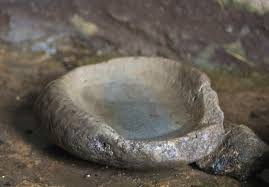(June 2015)
 While officials are busy planning for the Pope's second Philadelphia coming, a pair of major water-main breaks in Philadelphia neighborhoods created floods of biblical proportions. Far from divine intervention, the deluge of millions of gallons of water that damaged properties and inconvenienced residents was man-made. More properly expressed, the flood resulted from the fact that pipes that were man-made more than a century ago were not replaced before they failed. With more than 3,000 miles of aging pipes beneath our feet, our failure to replace aging pipes will mean that, every few days, some Philadelphians will be walking on water until the rapture.
While officials are busy planning for the Pope's second Philadelphia coming, a pair of major water-main breaks in Philadelphia neighborhoods created floods of biblical proportions. Far from divine intervention, the deluge of millions of gallons of water that damaged properties and inconvenienced residents was man-made. More properly expressed, the flood resulted from the fact that pipes that were man-made more than a century ago were not replaced before they failed. With more than 3,000 miles of aging pipes beneath our feet, our failure to replace aging pipes will mean that, every few days, some Philadelphians will be walking on water until the rapture.
Philadelphia will endure about 900 water-main breaks this year. Decreasing the number of breaks and reducing the risk to people and property by replacing century-old pipes will take resources. But what would be the cost?
I asked that question via Twitter after Water Department officials released a frightening image of the ruptured pipe responsible for one of the recent floods. Suddenly, the public-relations information flow slowed to less than a trickle.
Here is the Twitter exchange:
Philadelphia Water @PhillyH2O
130 years of service from this #infrastructure pic.twitter.com/d2uUio8SWd
Brett Mandel @brettmandel
That's a pretty good run (but a dreadful end). RT “@PhillyH2O: 130 years of service from this #infrastructure ”
Philadelphia Water @PhillyH2O
@brettmandel Indeed dreadful. Lots of cleanup and construction ahead in the neighborhood.
Brett Mandel @brettmandel
@PhillyH2O - So what would it take for this to not happen in the future?
Philadelphia Water @PhillyH2O
@brettmandel No good answer in 140. These large main breaks are not very common, however. Mains break every day http://bit.ly/main-break
Brett Mandel @brettmandel
@PhillyH2O - That's not an answer. What money, technology, person-power is needed to make significant improvement?
Philadelphia Water @PhillyH2O
@brettmandel It's a balance. Can't dig up the whole city at once. A message from the commish on the #valueofwater http://www.thevalueofwater.org/content/philly-water-main-breaks-building... …
Brett Mandel @brettmandel
@PhillyH2O - C'mon! What is the cost to cut the number of breaks in half? Or does technology not exist to do so?
Philadelphia Water @PhillyH2O
@brettmandel The links give numbers/strategy to address. Factors like weather are hard to control w/tech. Unfortunately, no simple answer.
Brett Mandel @brettmandel
@PhillyH2O - So when the next Mayor says, "How can we reduce the number of water main breaks? I really want to do this." You have no answer?
Can it be that the Water Department does not know what it would take to fix this problem? I doubt it, but the lack of a clear response is telling us something.
GIVE US THIS DAY…
A similar problem muddies the water as city and state lawmakers debate additional funding for Philadelphia schools. Last year, in a missive I titled “School Superintendent William Hite's Big But” (http://brettmandel.com/content/school-superintendent-william-hites-big), I lamented the fact that the funding request for the School District’s Action Plan v2.0 is identified as insufficient to fully implement the plan, itself.
We are arguing over pennies that will make no real change. We need to focus on dollars that can create results.
Instead of identifying the resources we need to be great -- schools that graduate students prepared for the best colleges and careers; infrastructure that moves people and products safely and efficiently -- we simply do a little more or less each year. We debate making the most marginal changes to school budgets, knowing our schools will fail most of our students. We make immaterial investments in our crumbling infrastructure knowing we place people and property at risk.
Budgets are about choices given limited resources. If we provided our lawmakers and the public with much more information about what positive outcomes our spending could produce, we could have a much better public discussion about our priorities -- which programs we choose to fund and at what levels; which programs we determine we are going to be unable to afford.
We all know from our household budgets that we find ways to pay for what we need, reserve what we determine to be luxuries for when we are able to afford them, and reluctantly agree that some expenditures will simply be beyond our means.
…LOAVES AND FISHES
To make our budget work, we must find a way to expand our ability to do more, learn to do more with less, or accept the fact that we must do less somewhere to do more elsewhere.
We need to do more well, which could mean we do less not-so-well. The key is setting priorities and monitoring outcomes. This is where we need more information about how our budgetary inputs connect to our public policy outcomes. Then we need more straight talk from our public officials so we can make better choices with our limited resources.
We cannot be a shining city on a hill if we do not invest well in our future -- and we cannot wait for divine intervention to make it happen. We need to prioritize effectively, choose carefully, and invest wisely. After all, God helps those who help themselves.
